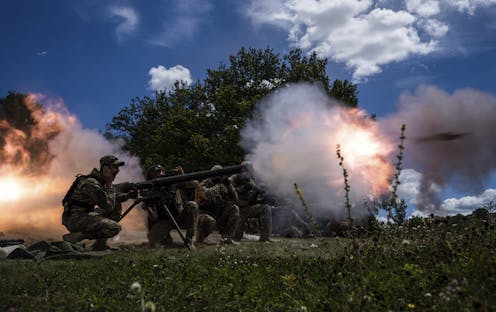
As the war in Ukraine drags on, both Russia’s Vladimir Putin and Ukraine’s Volodymyr Zelenskyy say it’s going their way.
Both sides are outwardly confident of ultimate success, but what does that mean? And how likely is such an outcome?
Putin has been careful lately not to raise expectations about the results of Russia’s “special military operation” in Ukraine, while Zelenskyy and his government suggest their goal is to liberate all Ukrainian territory seized by Russia — including Crimea, annexed by the Russians in 2014.
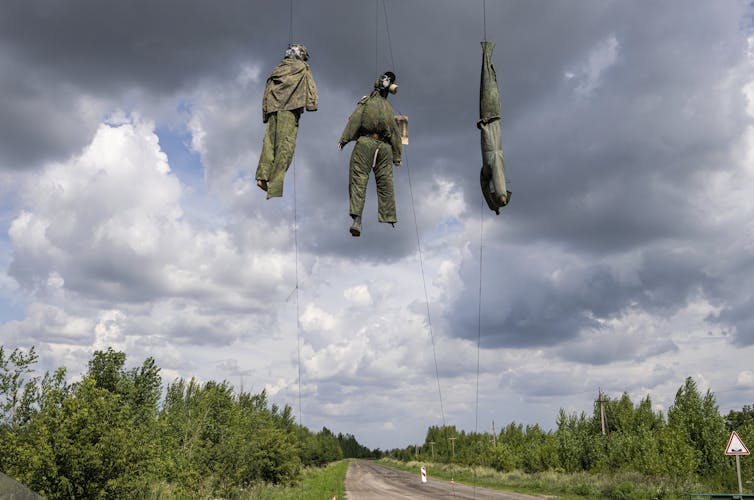
Putin’s invasion will certainly not result in Russia “demilitarizing and de-Nazifying Ukraine,” as he suggested it would at the outset. Ukraine isn’t joining NATO as Russia had feared, but it still aspires to become a European Union member. Either way, it will remain heavily armed by the West after the war is finally over.
Russia’s territorial gains
Despite initial setbacks, Russian forces are slowly taking control of the Donbas region in eastern Ukraine and currently hold a huge swath of territory connecting Crimea with Russian territory to the east.
Russia’s failure to take Kyiv may have been a costly embarrassment, but Putin can always argue that the primary purpose of the invasion was to secure the independence of the Donetsk and Luhansk republics.
Putin said at the start of the invasion there was no intention to occupy all of Ukraine. That means he’ll be able to present any territory gained in addition to securing Donetsk and Luhansk as a win.
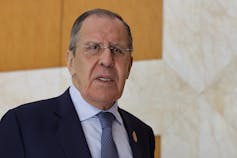
Russian Foreign Minister Sergey Lavrov recently suggested Russia plans to secure more territory than initially intended in the light of the West supplying long-range rocket systems to Ukraine.
But Russia already controls enough new territory to boast about, and could give a little ground in the south and still claim success.
Battlefield successes and failures
For Zelenskyy, Ukraine’s defence of Kyiv at the beginning of the war was a resounding victory. Ukraine’s reoccupation of significant territory significantly boosted Ukrainian morale. Western fears of Ukrainian collapse proved unfounded.
However, Russian forces redeployed from those areas have resulted in increased strength and success in the east. Ukrainian held Russian forces in Mariupol on the Black Sea for some time, but it still fell. So did Lysychansk in the Donbas.
After failures near Kyiv, Russia quickly started to play to its strengths, including in artillery.
Read more: Russia is now reliant on heavy artillery — Stalin's ‘God of War’ — in Ukraine
Russia’s losses have certainly decreased significantly since the first weeks of the war. Ukraine’s have increased.
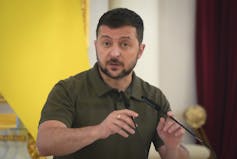
Although Zelenskyy says Ukrainian losses are around 30 per day killed and 250 wounded, if Ukraine started losing 200 troops a day, as was the case recently, such losses would not be sustainable. Ukrainian forces will undoubtedly suffer more significant losses as they start their own offensive operations aimed at recapturing southern Ukraine.
Many experts claim the ground war is about to turn in Ukraine’s favour, but the evidence still suggests otherwise.
Russia’s size advantage
During the last decade, Ukraine’s army grew significantly to about 200,000 regular troops. By July 2022, the Ukrainian government says it had more than 700,000 troops. Many of these troops have yet to be fully trained, and doing so takes time.
In the long term, Ukraine still has a much smaller population to draw on than Russia.
Russian losses have also been heavy. In late March, the Russian government acknowledged the loss of 1,351 troops killed in the war to date, likely an under-representation. The CIA estimates 15,000 Russian troops have been killed since the invasion’s outset.
So far Russia hasn’t expanded the draft and has tried to keep conscripts from fighting, recently seeking to increase the number of volunteers for the war.
Russia has perhaps 800,000 troops in uniform to draw on.
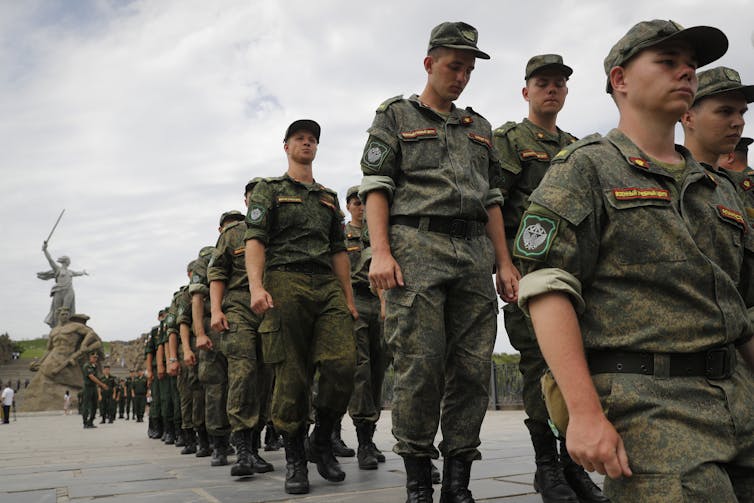
Ukraine’s western support
Russia may have the advantage of a larger population, army and considerable stocks of weapons and munitions, but Zelenskyy has western support.
Western weapons continue to arrive in Ukraine, with long-range artillery systems playing a meaningful role on the battlefield.
Western leaders have certainly been unanimous in stating their long-term commitments to Ukraine both in terms of providing military equipment and maintaining sanctions against Russia. Whether those commitments will hold in the longer term remains to be seen.
In the short to medium term, sanctions are probably doing as much damage to western and developing economies as to Russia’s, and are undoubtedly contributing to high food prices and inflation across the world.
Is western Europe prepared for a winter without Russian oil and gas?
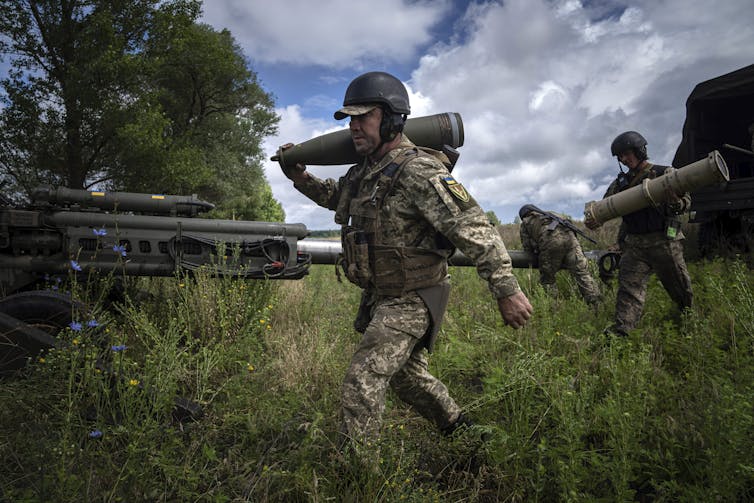
Domestic supporters and opponents
Both Putin and Zelenskyy face opposition to their war efforts at home.
Prior to the invasion, Zelenskyy’s government introduced laws to push back against the use of the Russian language in public life by strengthening requirements for Ukrainian. After the invasion, the Ukrainian government banned a slew of opposition parties, although only some had clear ties to Russia.
The government is also removing Russian cultural symbols in Ukraine. Such policies may go down well in western Ukraine, but not necessarily in the east.
Zelenskyy’s recent sacking of his intelligence chief and prosecutor general highlights the fact that not all Ukrainians are loyal to Kyiv. Large numbers of Russian-speakers in the east are being charged with collaborating with Russia, allegations that likely fuel resentment there.
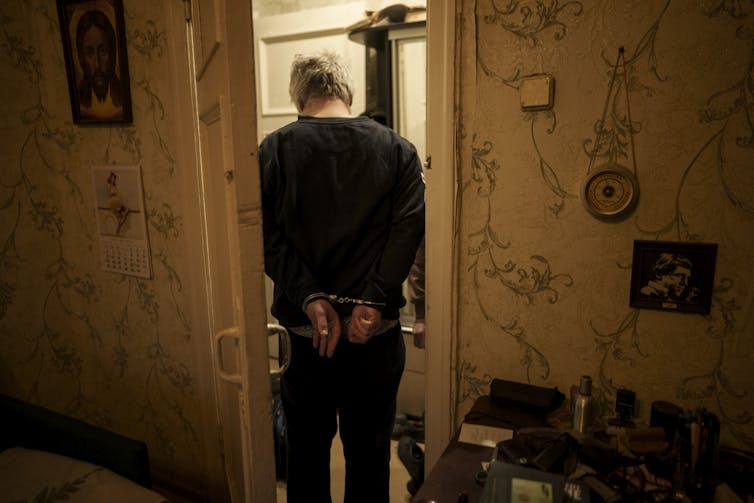
In Russia, meantime, there is still opposition to the war despite crackdowns. Bleak news of the mounting Russian death toll can only be partially suppressed.
Although in Russia, sanctions are certainly biting, the economy remains more robust than many western observers predicted.
Putting a brave face on it
Both Putin and Zelenskyy are outwardly optimistic about their prospects for victory, but both face increasing challenges if the war drags on for months or years.
In terms of stated aims, some sort of Russian victory — albeit a costly one — is certainly far closer than the sort of victory upon which Zelenskyy has pinned his hopes.
One thing’s for certain: Thousands more will be killed or wounded in what has become yet another bloody war on former Soviet territory since the collapse of the Soviet Union in 1991.
Alexander Hill does not work for, consult, own shares in or receive funding from any company or organisation that would benefit from this article, and has disclosed no relevant affiliations beyond their academic appointment.
This article was originally published on The Conversation. Read the original article.







